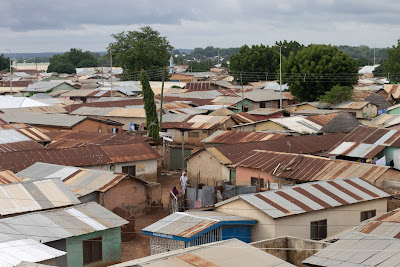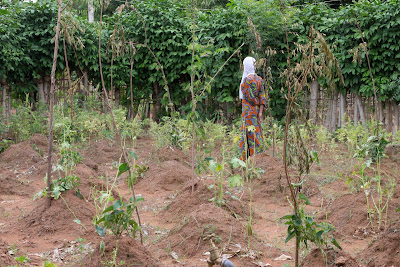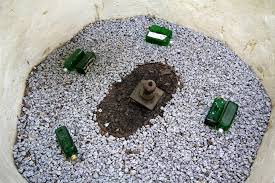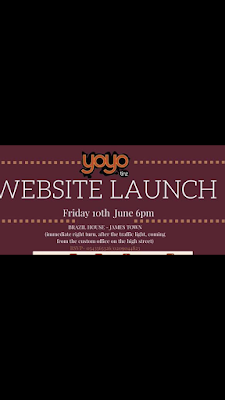I woke up from a night of endless tequila; the alarm
interrupted my drunken slumber. I texted reluctantly: "I'm awake.” Then
later and shamelessly, "let me know when you're on your way so I can get
out of bed."
I was picked up in a compact car, tiny, really. I slumped
in the backseat, trying to will away the hangover. It didn’t work. But we all
agreed that food would make everything better.
Waakye was the first stop. Ghanaian-style rice and beans
topped with a hard boiled egg, noodles and orange cous cous-like garnish. A fly
took one of my eggs hostage.
Once
our bellies were full, we were off again,
speeding down the road. Accra behind us and paradise in the horizon.
But then, police waved us to the side, “checking for arms,”
they said. They turned the car upside down; no warrant, no precedent, including
our personal bags. They looked through the glove compartment, my friend’s
cigarette case, makeup bags, our sunglass cases, furiously.
What were they
looking for?
A hash toffee was found inside the driver’s wallet. They
demanded she drive the car into the mud, so the car was obscured from the
highway, and then to turn over the keys. She would be arrested.
“I thought you were looking for arms,” she said, softly.
She was escorted across the street and into the police
truck, despite endless pleads in the form of “boss, I beg.” The
two of us remaining were ordered to sit in
the car, so as not to bring attention by standing on the side of the road.
Hours passed, they wanted money; they were scared to ask
for money. Between the three of us, we were a radio personality, a famous rapper and an “obruni”: a
white person. They thought they hit it big, but knew they needed to play it
cool.
After about two hours, one of the cops came to retrieve the driver's phone so she could call us to finally ask for money. We didn't even have
100 Ghana on us and they wanted a thousand.
So we were instructed to leave our cash in the car and
walk deep into the mud, away from the highway, further obscured from the
highway’s view. The cop, who grabbed her phone, then hopped into the passenger
seat and ordered her to drive to the ATM to empty her bank account. His AK
rested on his lap like a pet or small child.
While we waited in the mud, we played catch with rocks,
raced them, too. See, we were delirious by this point. “Is this real life?” We
asked, volleying between anger and disbelief.
The mere 250 she was able to withdraw was not enough, she
called to say, even though she brandished the receipt that showed her account
at $0. The police were firm on their 1,000, even though our pockets were
completely empty and so was her bank account. “Call your boss or your mom,”
they suggested.
Our friend and the cop finally returned, and again she was
placed inside the police car.
I was fed up.
I stood on the side of the road, glaring at the pigs in
uniform, daring any to meet my eyes. Five minutes later, we were free.
They took the money, returned the hash toffee to my
friend, and advised her to take it, because another cop would be quick to
extort her, too, they said.
Would we still go after all that?
“Yes, let's go,” we agreed. Plus the edible would set in
soon. Jay-Z’s new album 4:44 was our
soundtrack for the remainder of the ride.
Cement road stopped and dirt road took over, a sign that
we were close.
We
entered a stunning private property, thanks to our artist friend. A bright
turquoise house, decorated with black-painted wood. Acres of green: mango
trees, flowers, bushes. Stone walkways guided us to straw couches and copious amounts of marijuana. We smoked, and then
again, to numb the corruption and our empty pockets, just a little.
Past the green was an acre of sand. Small tables shaded by
umbrellas and adinkra symbols. We walked deeper until the lake water
touched our toes. We swam until we were tired.
As night crept in, we moved from the water to land. We
sprayed our ankles with my natural lemon and eucalyptus bug spray, slightly
symbiotic to the juicy fruit that was presented to us. Bananas, papaya,
pineapple and lots of it, we stuffed it in our mouths, swatting mosquitoes with
one hand and wiping our chins with the other.
It was getting darker.
We made our way to get food. It was a nearly 30-minute
journey to a restaurant that was hid by tall panels of wood, with a Thai menu on
its awning as well as the words "Cuban cigars."
Inside, stretched, oversized and vintage leather chairs,
globes, and a map of Paris adorned the place. Louis Armstrong played and cigar
smoke masked the rounds and rounds of weed. Endless white wine prevented cottonmouth,
thanks to the owner, who tended to our needs with a strong British accent and
short shorts, his thick thighs begging for air. The only traces of his
Ghanaian origins were when he switched to Pidgin English.
Then pad thai came, with shrimp, so succulent; we inhaled.
We talked international politics, trying to be louder than the jazz that consumed
the room.
High, and satisfied, we left. It was pitch black, I fell
asleep in the back only to be woken by thunderous music. I jerked up to a sea
of people, gyrating, sweating, joyous. It was like being in a car in the club.
Were we on the street or in someone's living room during a house party? Were we
on drugs or were they?
The couple grinding center-street, needed to be shaken
from their lust to move out of the way. A retreat to let the car pass became
part of the choreography rather than an interruption to their party.
We
made it through and thought we were finished
with the obstacle course until we came across a herd of small goats immediately afterward. Their bodies snuggled inside the potholes, their bellies pressed against the ground to feel its
warmth and in a formation that was maze-like. We dodged them.
The beach was the last stop. The wind was cold and the
water was angry and aggressive.
Finally back to the lake house, the two women slept in a
massive-sized bed, the largest I’d ever seen in Ghana.
We woke up early, to go read by the lake before breakfast
was served. Fried eggs in unprocessed coconut oil kept arriving at the table. So
ongoing that we imagined there was likely an egg waterfall in the kitchen.
Lemongrass tea and raw honey washed down the thick white bread.
We swam, again, until our shoulders turned various shades
of brown. Time was the farthest thing from our minds.
Finally we prepared to leave and thanked our host for
everything he’d done. He gave us money, because even though we spent no money
while there, we still had nothing.
We passed a police barrier on the way back; they barely
looked up, too preoccupied with the money they were counting.
And just five minutes past the police barrier, a huge
billboard with a picture of policemen on motorbikes flashing their lights, said in
block letters: “DON’T CORRUPT THE POLICE.”
This was the best and worst of Ghana.























